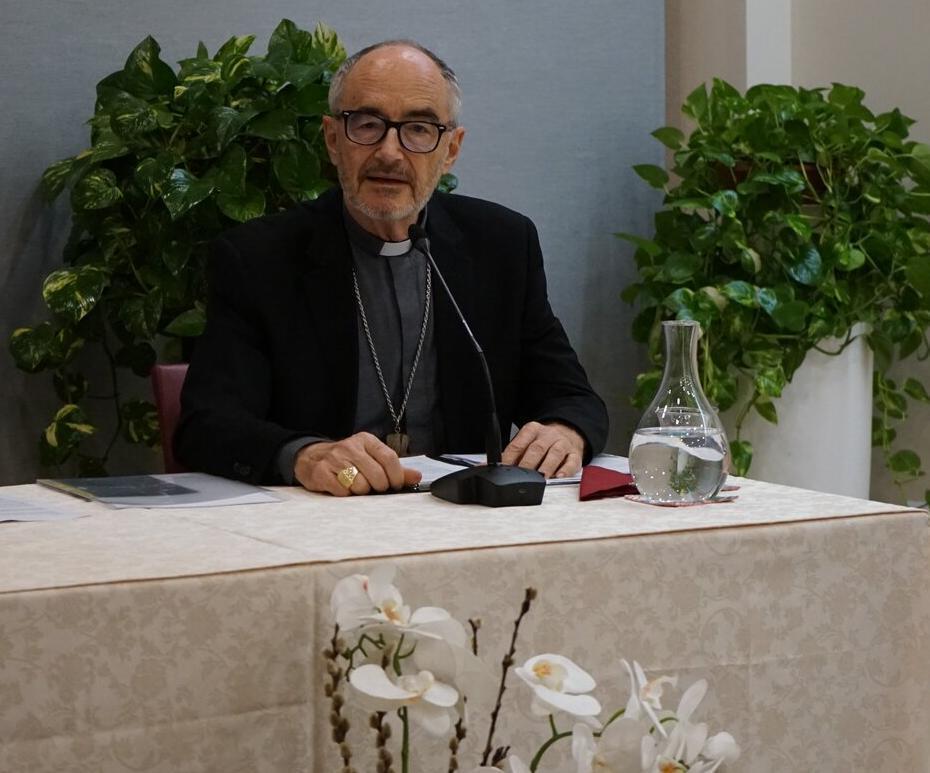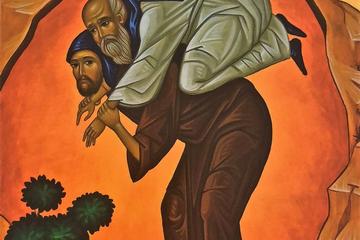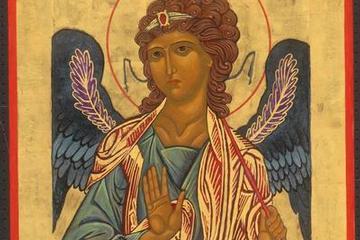
ROME - Resilience is about bouncing-back, but that does not mean merely returning to things as they used to be in the past. “We cannot go back to old ways after the pandemic,” said Pope Francis on Aug. 26, 2020. “Anyone who thinks that the only lesson to be learned was the need to improve what we were already doing… is denying reality.” (“Fratelli tutti,” no.7)
On Nov. 18, The Lay Centre closed its “Nurturing Resilience” online series with a live-streamed reflection by Cardinal Michael F. Czerny, SJ, under-secretary of the Migrants and Refugees Section of the Holy See’s Dicastery for Promoting Integral Human Development. He reflected on the topic “All in the same boat: Nurturing Resilience in a Global Community,” and engaged in dialogue with scholars and young professionals who are members of The Lay Centre community in Rome.
In light of Pope Francis’ encyclical letter “Fratelli tutti,'' Cardinal Czerny spoke about how to build paths of social friendship, reconciliation and fraternity, or “paths of renewed encounter,” in the words of the Holy Father.
You can read Cardinal Czerny's full reflection below and also watch the Nov. 18 event on our Facebook page.
We also want to make available The Lay Centre's complete online series, “Nurturing Resilience,” comprising five reflections:
- Introduction: Nurturing resilience, by Dr. Donna Orsuto
- Focus on the essential, by Archbishop Ian Ernest
- Promoting resilience in our self and with others, by Dr. Maryanne Loughry, RSM
- Practical resilience, by Catherine Stevenson, M.D.
- Learning resilience between generations, by Dr. Filipe Domingues
All in the same boat: Nurturing Resilience in a Global Community [FULL TEXT]
By Cardinal Michael Czerny S.J.
Today’s title comes from Pope Francis’s Urbi et orbi addresses on Friday, March 27 and Easter Sunday, April 6: “We are all in the same boat,” while the theme is The Lay Centre’s first-semester series on resilience. Four previous speakers have made important contributions to the topic, as does the seventh chapter of “Fratelli tutti,'' "Paths of renewed encounter."
"Fratelli tutti,'' is a great act of faith. As Sister Maryanne Loughry, RSM said on October 30, we learn that, "in spite of the present crisis, humans will rebound; that the multiple systems we are part of must promote and strengthen the psychosocial factors that in turn will promote resilience; and that, in particular, our expressions of faith — tradition, celebration, and a sense of community — play an essential role."
In grad school in the 70s, we were taught to “problematize” which, at first glance, does not seem to be a good thing, since problems tend to be obstacles and what you want is to resolve them and move on. But recognizing that things are often not simply as they seem, to problematize is to consider something obvious, unproblematic, to discover that it is not so easy or as resolved as one might like to think. It is to question something that is taken for granted and not questioned at all. To problematize is to dig beneath the surface, to root around in the basement, with the hope of finding out what is really going on. The purpose is to get into a better position to propose a more promising approach, a really probable solution.
So when I was assigned “resilience,” I noticed it was a word we did not use when I was in grad school, but it has come in as something good and admirable. I found out it is the ability of a substance to return to its usual shape after being bent, stretched, or pressured. When applied to people, "resilience" tends to suggest that outcomes or results have turned out more positive than expected. Simply put, it is “bounce-back.”
But this idea bounced against something Pope Francis has been saying in this time of Covid: “We cannot go back to old ways after the pandemic” (Aug. 26 2020). “Anyone who thinks that the only lesson to be learned was the need to improve what we were already doing ... is denying reality” (“Fratelli tutti,'' no.7).
While puzzling about “resilience” or bounding-back, I learned another new idea: “precariat.” The word comes from combining precarious with proletariat. Precariat combines a huge population and its conditions. Intermittent employment or underemployment or just hanging out waiting for work, are ever more widespread. According to a 2020 Oxfam report: “Only 1 in 6 countries spends enough on health, only one third of the global workforce has adequate social protection, and in more than 100 countries at least 1 in 3 workers has no labour protection.” The growing absence of decent and secure work results in many precarious existences, insecure and unpredictable existences. In brief, objectively and subjectively miserable.
Putting the two together, I began to wonder if what the precariat need is resilience. They do not want to bounce back or rebound. They want to move on to decent work and the life that goes with it, as Catholic Social Thought (e.g. Laborem Exercens) teaches.
With Covid-19, we can take the term precariat in a broader way to mean everyone on earth. All lives are more precarious now. This is the same boat we are all in. The entire human family is a precariat occupying the habitable land mass surrounded by oceans, one and only one lifeboat. Life in this boat is precarious because, instead of behaving like fratelli tutti, humans assault each other and assault our natural environment too.
In “Laudato si’” and “Fratelli tutti,'', Pope Francis does a great job of problematizing this penchant for assault which has brought us to real crisis, both exacerbated and revealed by the global pandemic. But what the Holy Father advocates is not a resilient return to previous states of affairs. Rather, we need to move decisively towards something new.
To illustrate this thought, let us reduce the size of the image. Imagine a lifeboat for 10 people with ten oars. Ten of us have filled it to capacity. We are rowing towards land. We cannot go back to our previous state, when we and many others were on a large vessel, because it has sunk.
Presently we come upon another survivor in the water. What to do? Do we squeeze in an 11th person and jeopardize a boat designed for 10?
We take the risk of dialogue and someone has an unusual idea: “Let us take turns. Each of us can swim for a few minutes, one after the other.” The boat will never overcrowd, and all 11 have a good chance of surviving.
Here, resilience does not mean nostalgia for the larger vessel, nor violently defending the current apparent security; it means going forward in a new way of achieving survival and more. Such are the paths forward that Pope Francis lays out in “Fratelli tutti.''
On November 13, Dr. Filipe Domingues reminded us of an essential virtue for moving forward: "As a Christian, I cannot help associating resilience with intergenerational solidarity. St. John Paul II’s famous definition of solidarity is applicable to the relationship between young and old. Solidarity ‘is a firm and persevering determination to commit oneself to the common good; that is to say to the good of all and of each individual, because we are all really responsible for all.’”
After advocating dialogue for negotiating our crises in Chapter Six of “Fratelli tutti,'' Chapter Seven would have us set out, in the words of its title, on “paths of renewed encounter” by acknowledging and indeed working-through our accumulated hurts, wounds, injuries and impasses (FT no.225).
For the wounds to heal, we must boldly start from the truth, from the recognition of historical truth, which is an inseparable companion of justice and mercy, and which is indispensable for the path towards forgiving and restoring peace. These paths entail the exercise of "penitential memory, one that can accept the past in order not to cloud the future” (FT no.226).
The current challenges reach back to the dawn of our moral consciousness, as Catherine Stevenson, M.D. said on November 6: "Bad things happen and bad things are happening. It does not mean we failed or that God failed us... Our Scriptures begin with the story of the expulsion from paradise. This story tells us that the world is now broken ... and that all life will experience suffering... Our faith tradition lets us know that life will be more of a series of crises to be negotiated.”
Only the truth of facts is a solid enough basis for mutual understanding, commitment to the common good, and openness to new solutions. And this connects with the need for memory. Forgiving does not mean forgetting (FT no.246, no.250); conflict is inevitable, but this does not mean that violence is acceptable. Starting processes of reconciliation requires time and patience, respect for victims’ memories, renouncing violent claims and working through the conflicts (FT no.244, no.251).
Memory also inspires us because much has been achieved and learned. As Archbishop Ian Ernest noted on October 23, history provides this reassurance: "The courage and the great sense of creativity of our ancestors have helped in facing the odds of life and in overcoming fear and despair. Progress and development were brought about because they were focussed on what was essential. They created the opportunities to make the world a better place to live." My time is almost up, so here is a mere reminder of “paths of renewed encounter" that Pope Francis traces in “Fratelli tutti,” Chapter Seven:
- The art and architecture of peace (FT no.228) which begins with the least (FT no.233)
- Promoting forgiveness (FT no.236) in the face of inevitable and legitimate conflicts (FT no.237, no.241), and reconciliation the best way to move on (FT no.244)
- Memory (FT no.246), forgiving but not forgetting (FT no.250)
- Renouncing war and capital punishment (FT no.255-no.270)
Conclusion
The last three words of Chapter Seven are “an enduring appeal.” To my mind, they sum up the ethical and spiritual thrust of the whole encyclical. “Fratelli tutti” is an urgent appeal for social friendship and fraternity. It must necessarily keep on appealing as long as humans prefer division and enmity over harmony and friendship - and only God knows how much, or little, time we have left.
In Chapter Seven, the paths of fraternity, friendship, harmony and hope are laid out. The next and final question is: Who is to step up? Chapter Eight answers: “Religions at the service of fraternity in our world.” From it, let me take this quote to conclude:
“From our faith experience and from the wisdom accumulated over centuries, but also from lessons learned from our many weaknesses and failures, we, the believers of the different religions, know that our witness to God benefits our societies [and] helps us recognize one another as travelling companions, truly brothers and sisters” (FT no.274).
Now, in our one same boat, let us talk and let us row!
The Lay Centre, Rome
November 18, 2020
Link
-
Dedicated website for Encyclical "Fratelli tutti"
-
Sito dedicato per l'enciclica "Fratelli tutti"
-
ENCYCLICAL LETTER FRATELLI TUTTI OF THE HOLY FATHER FRANCIS ON FRATERNITY AND SOCIAL FRIENDSHIP
-
IOANNES PAULUS PP. II LABOREM EXERCENS To His Venerable Brothers in the Episcopate to the Priests to the Religious Families to the sons and daughter
-
IOANNES PAULUS PP. II SOLLICITUDO REI SOCIALIS


